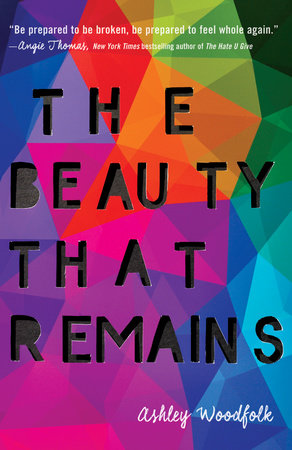Writing Through Fear:
A Chat with Ashley Woodfolk About Her Heartbreaking YA Novel
by Wesley Salazar
In this interview, I chatted with Ashley Woodfolk, who recently released The Beauty That Remains, her debut novel centered on three teenagers who each face the heartbreak of losing someone they love dearly — a best friend, a significant other, a sister. Through alternating narrators, Woodfolk presents a touching story about love and the many ways in which grief can unexpectedly suspend, and permanently alter, one’s life. Read on to learn more about Woodfolk’s own story and the driving forces behind her moving YA novel.
What inspired you to write a YA novel about love and grief?
I don’t think I’m overstating when I say that love is existential for me — I literally live for the people I care about. So losing anyone I hold close to my heart feels like a direct threat to my own well-being. That said, loss is inevitable, and I’m constantly trying to hold those two truths in my head at the same time: That I will certainly experience loss and that I often feel I can’t live without those whom I love most.
When someone very close to me moved more than 3,000 miles away a few years ago, my anxiety about loss peaked. I convinced myself that something horrible would happen to him and that I’d find out about it online because I didn’t know any of his new friends. I started seeing a therapist who suggested writing through the fear. When I started writing, the first draft of this book is what came out.
How did you discover and develop the three central characters in The Beauty That Remains?
The characters were originally conceived as embodiments of three different stages of grief. Autumn was going to represent depression. Logan, anger. And Shay, acceptance. But as the characters and their stories developed, it became much more complicated than that initial concept. And I let the characters grow into who they needed to be to tell the story best.
The power of creativity, specifically as it relates to music, underpins the novel’s narrative. What do music and self-expression mean to Autumn, Shay, and Logan? What do they mean to you?
I think loss is one of those universal experiences that no one really knows how to talk about. But art is a language that nearly everyone understands. I really do believe that it has the power to heal — to make you feel seen and hopeful and less alone, and I think that’s what I wanted this book and the characters to reveal. Music and art are important to Autumn, Shay, and Logan because it embodies feelings they don’t know how to express with words, and there’s a real kind of power in that. It does the same for me.
Can you talk a bit about the role that modern technology plays in the three characters’ connections to their lost loved ones?
It would be easy to answer this question by writing about how texting and Instagram are changing the way we interact, and that once someone moves away or becomes estranged from you or dies, that there’s still this digital “presence” left behind. I could write about how someone might find themselves returning to online profiles or photos or videos again and again because they miss someone, as the characters in my book do, but I think the truth is a little more complicated than that.
In my novel, I use technology as a vehicle for how my characters experience their losses, but I think it’s important to point out that it isn’t the key. At the root of it all is a longing for something — a relationship — and someone who is suddenly absent. It’s about learning that just because a person is gone it doesn’t mean your relationship with that person stops. I was trying to tell an authentic story about loss, and social media is a huge part of our everyday lives now. More than anything, I hope the way I’ve woven technology into my story feels real.
What do you think are some of the unique challenges related to life, love, and loss that teens face today? Do you think storytelling can help them face these challenges?
I think every generation of teens has their own unique set of challenges — that every single individual does, and that they’re always changing. I won’t guess at what those challenges might be for anyone else, but I’ll just say I know what my own were and what they continue to be, and stories and storytelling have helped me through some of my darkest moments. I’m almost certain I’m not alone in that, so I’d say if you’re feeling lost and alone, you won’t lose anything at all by giving books a try.
Do you have any recommendations of other YA novels that fans of your book should pick up and read next?
Anything by Nina LaCour, Jeff Zentner, or Jandy Nelson.

